

New Economic PerspectivesNew Economic. By Dan Kervick.
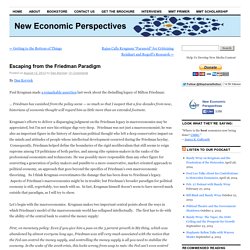
© Reuters.

Outgoing US Federal Reserve Board chairman Bernanke appears at Brookings Institution in Washington (Reuters) - Ben Bernanke, former chairman of the U.S. Federal Reserve, has agreed to become a senior adviser to Citadel Investment Group, a $25 billion hedge fund founded by billionaire investor Kenneth Griffin, the New York Times reported on Thursday. Bernanke, who handed the reins of the U.S. central bank to Janet Yellen last year, will advise Citadel's investment committees on global economic and financial issues and meet the fund's investors, the newspaper said. Either I manage to stay on most people's good sides, or most people just don't care about me that much, but for whatever reason, Noah smackdown attempts are rare.

Several commenters asked me why the liquidity trap hypothesis implies that countries are unable to devalue their currencies in the forex markets.
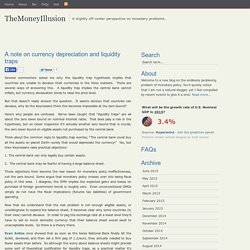
There are several ways of answering this. A liquidity trap implies the central bank cannot inflate, but currency devaluation tends to raise the price level. But that doesn’t really answer the question. I See Very Serious Dead People - NYTimes.com. Microsoft PowerPoint - PikettyZucman2012Slides.ppt - PikettyZucman2012Slide. Journal Articles. Strip private banks of their power to create money - FT.com. Scott Sumner Busts Krugman. 31 Jan 2015.

Noahpinion: Nuclear will die. Solar will live. In a recent article, I suggested that batteries might replace oil for many of our transportation needs within two decades.
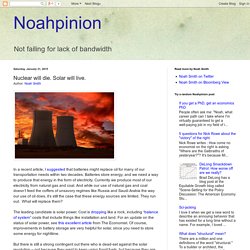
Batteries store energy, and we need a way to produce that energy in the form of electricity. Currently we produce most of our electricity from natural gas and coal. And while our use of natural gas and coal doesn’t feed the coffers of unsavory regimes like Russia and Saudi Arabia the way our use of oil does, it’s still the case that these energy sources are limited. Noahpinion: R vs. g. In his new book, Thomas Piketty argues that R, the rate of return on capital (which is different than the safe interest rate "r") is greater than g, the rate of economic growth, and that this fact can be expected to continue into the indefinite future, resulting in an ever-rising capital share of income and an ever-falling labor share.

The big question is whether R really will be greater than g into the foreseeable future. Noahpinion: The Great Labor Dump. One of my favorite teachers at Michigan was a self-effacing but brilliant labor economist named Mike Elsby.
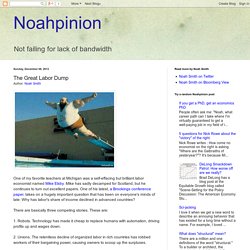
Mike has sadly decamped for Scotland, but he continues to turn out excellent papers. One of his latest, a Brookings conference paper, takes on a hugely important question that has been on everyone's minds of late: Why has labor's share of income declined in advanced countries? TheMoneyIllusion » Krugman vs. Smith. Noah Smith recently did a post discussing the long period of deflation in Japan, and noted that NK models generally predict that wages and prices should eventually adjust to restore full employment.
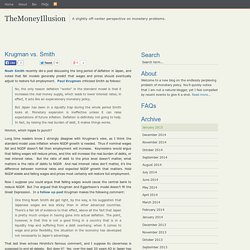
Paul Krugman criticized Smith as follows: No, the only reason deflation “works” in the standard model is that it increases the real money supply, which leads to lower interest rates; in effect, it acts like an expansionary monetary policy.But Japan has been in a liquidity trap during the whole period Smith looks at. Monetary expansion is ineffective unless it can raise expectations of future inflation. A New Macroeconomic Strategy by Jeffrey D. Sachs. NEW YORK – I am a macroeconomist, but I dissent from the profession’s two leading camps in the United States: the neo-Keynesians, who focus on boosting aggregate demand, and the supply-siders, who focus on cutting taxes.
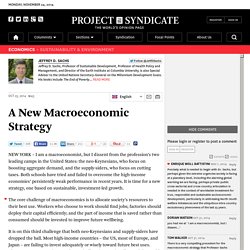
Both schools have tried and failed to overcome the high-income economies’ persistently weak performance in recent years. No, really. Business Insider contacted him about his 2009 warning that soaring inflation and interest rates were just around the corner — and he not only admits that he was wrong, he admits that his error signified something wrong with his overall economic model: The Economic Consequences of Mr. Rajoy - NYTimes.com. A Permanent Slump? - NYTimes.com. Why We’re in a New Gilded Age by Paul Krugman. Capital in the Twenty-First Century by Thomas Piketty, translated from the French by Arthur Goldhammer Belknap Press/Harvard University Press, 685 pp., $39.95 Thomas Piketty, professor at the Paris School of Economics, isn’t a household name, although that may change with the English-language publication of his magnificent, sweeping meditation on inequality, Capital in the Twenty-First Century.
Yet his influence runs deep. The Piketty Panic - NYTimes.com. “Capital in the Twenty-First Century,” the new book by the French economist Thomas Piketty, is a bona fide phenomenon. Other books on economics have been best sellers, but Mr. Piketty’s contribution is serious, discourse-changing scholarship in a way most best sellers aren’t. And conservatives are terrified. Thus James Pethokoukis of the American Enterprise Institute warns in National Review that Mr. Piketty’s work must be refuted, because otherwise it “will spread among the clerisy and reshape the political economic landscape on which all future policy battles will be waged.” James Buchanan (1919-2013), Appreciations. The Economist explains: Thomas Piketty’s “Capital”, summarised in four para. It is the economics book that took the world by storm. Capital in the Twenty-First Century, written by the French economist Thomas Piketty, was published in French in 2013 and in English in March 2014.
The English version quickly became an unlikely bestseller, and it prompted a broad and energetic debate on the book’s subject: the outlook for global inequality. Some reckon it heralds or may itself cause a pronounced shift in the focus of economic policy, toward distributional questions. World Thinkers 2015: Jeremy Rifkin.